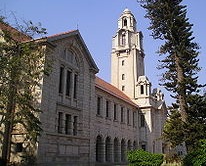 The Indian Institute of Science is a premier research institution of higher learning located in Bengaluru, India.
The Indian Institute of Science is a premier research institution of higher learning located in Bengaluru, India.
The Indian Institute of Science (IISc) was conceived as a 'Research Institute' or 'University of Research' by Jamsetji Nusserwanji Tata, in the twilight years of the 19th century. A long period of almost thirteen years was to elapse from the initial conception in 1896 to the birth of the Institute on May 27, 1909.
IISc currently ranks first in India in terms of research output and quality of faculty (citation and impact factor). It also ranks first among Indian universities (and South Asian universities) in the "Academic ranking of world universities" conducted by the SJTU, China.
IISc has been ranked the number one engineering/technology institute among top 67 science institutes in the country.The ranking has been done on basis of publications and citations and research record available between 1999 and 2008 in the Scopus International multi-disciplinary, bibliographical database.
The Institute spends the highest amount on research among all universities in India. Admissions to IISc are highly competitive, consistently admitting only the top 1 percent of those attempting the Graduate Aptitude Test in Engineering(GATE).
| Established: | 1909 |
| Type: | Research Institution |
| Director: | P. Balaram |
| Location: | Bangalore, Karnataka, India |
| Website: | www.iisc.ernet.in |
The Institute was the first to introduce
(i) Masters programs in engineering;
(ii) more recently, the Integrated Ph. D. Programs in Biological, Chemical, Physical and Mathematical Sciences for science graduates;
(iii) the new IISc Young Fellowship program for the first 20 rank holders at the + 2 level; and
(iv) IISc Young Engineering Fellowship program for merited III year B. E. / B. Tech. students.
The library was established in 1911 and it is one of the first three departments started in the Institute (the other two are Departments of General and Applied Chemistry and Electrotechnology). It is regarded as one of the best scientific and technical libraries in India.
Hostel facilities:
The institution provides on-site residential facilities for both male and female attendees to the institution. It also provides accommodation for married attendees in the form of family friendly accommodation. Some of the older hostels in the Indian Institute of Science campus are Ashwini, Bharini, Krithika and Rohini. Interestingly, these are named after the Hindu names for lunar mansions. Similarly, the apartments for married attendees of the institution are named Kaveri, Kapila and Bhaskara, which are prominent holy rivers and Vedic Sages in Hinduism.
Degrees offered:
Degrees offered by the institute may be broadly classified into two categories: Degrees by Research (PhD, integrated PhD, and MS(Engg.)), and degrees by coursework (ME/MTech/MBA/MDes).
Research programs leading to M.S(Engg)/MSc/PhD degrees are the main thrust in many departments. The program has a limited amount of course work, essentially to prepare the student to carry out the research, but the main emphasis is on the thesis work. PhD, MSc and M.S(Engg)degrees each year, which is probably the largest for any institution in India. The annual intake of research students is approximately 250 with several candidates sponsored from educational institutions and industries.
Admission Procedure:
Admission into IISc is highly competitive. Usually only the top 1 percent candidates qualifying the GATE examination are able to clear the cutoff for M. E. / M. Tech. admissions. Depending on the department and the number of students, the cutoff can get much higher. Admission to research programmes of the Institute, both PhD and M.Sc(Engg), is based on career analysis and (possibly) multiple rounds of technical interviews in the campus.
ADMISSIONS FOR THE ACADEMIC YEAR:
Qualifying in one of the following appropriate Tests (with valid certificate) is mandatory for the candidates applying for Ph D in Science, Interdisciplinary programs and M Sc(Engg): CSIR-UGC NET for JRF; or UGC-NET for JRF; or DBT JRF or ICMR JRF; or JEST; or NBHM; or IISc Entrance Test; or GATE. This is not applicable to the candidates who possess a Master’s degree in Engineering/Technology/ Management (post BE/B Tech) who wish to apply for a Ph d in Engineering.
IISc Entrance Test is conducted in Atmospheric Sciences, Biological Sciences, Chemistry, Ecological Sciences, Mathematics, Management Studies, Materials Science.
Course program:
1. ME
2. M Tech
3. M Des
Research program :
Doctoral (Ph D) and Master’s (M Sc [Engg]) in 29 departments/ centres/ units. In addition, a doctoral (Ph D) program is available in 6 interdisciplinary areas.
Admission to Ph D in Engineering is open to candidates with BE /B Tech/M Sc degree.
Academic Research:
1. Computing Facilities
The Supercomputer Education and Research Centre (SERC) is the country's leading computing centre having the state-of-the art computing facilities, catering to the ever-increasing demands of high performance computing for scientific and engineering research. More Details..
2. Cryogenic Facility Details..
3. Nano Center
4. Nano Electronic
The Center of Excellence in Nanoelectronics (CEN) at the Indian Institute of Science (IISc) focuses on research and education in the areas of nano-scale electronics, devices, technologies, materials, micro and nanoelectromechanical systems, bio-electronic interfaces, and integrated small-scale systems. More Details..
5. Science Information
NCSI was established in 1983, as a University Grants Commission (India) Inter-University Centre (IUC). Formerly, as UGC-IUC for science information, NCSI provided national level current awareness services to researchers in Indian universities during 1984 to 2002. More Details..
6. Nuclear Magnetics Resonance Details..
Contact Us:
Central Exchange Contact : +91-80-2293 2004/2228/2001
Telegram : SCIENCE BANGALORE 560 012
Fax : +91-80-2360 0683/0085
Registrar
Mailing Address :
The Registrar
Indian Institute of Science
Bangalore 560 012, INDIA
Telephone : +91-80-23600757
Email : regr@admin.iisc.ernet.in